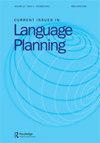语言学习者是隐形的计划者:以中国大学阿拉伯语课程为例
IF 1.8
1区 文学
Q2 EDUCATION & EDUCATIONAL RESEARCH
引用次数: 4
摘要
摘要尽管英语在全球占据主导地位,但在中国的外语规划中,英语以外的语言的教学越来越受到关注。本研究旨在通过代理作为一种空间、时间和对话结构的视角,展示中国大学阿拉伯语选修课程的发展。我们调查了代表三组参与者的24名参与者——有权力的人、有专业知识的人和有兴趣的人——在语言管理理论过程模型规定的语言规划的五个阶段(即注意、评估、调整设计、实施、反馈)中如何行使他们的代理权。根据叙事叙述和半结构化访谈,研究结果揭示了分布在五个阶段的不同演员之间不断的互动。特别是,我们发现这五个阶段并不是以线性的方式进行的,研究结果表明,在微观语言规划过程中,除了外部循环之外,还存在内部循环。语言学习者是LOTE项目中的隐形策划者。该研究得出的结论是,尽管存在各种结构性限制,但当地的不同行为者需要协调努力,协商空间,以维持不太常用的语言的教学。本文章由计算机程序翻译,如有差异,请以英文原文为准。
Language learners as invisible planners: a case study of an Arabic language program in a Chinese university
ABSTRACT Despite the predominant position of global English, teaching and learning of languages other than English (LOTEs) are gaining increasing attention in foreign language planning in China. This study aims to showcase the development of an elective Arabic language program in a Chinese university through the lens of agency as a spatial, temporal, and dialogical construct. We investigated how 24 participants representing three groups of actors—people with power, people with expertise, and people with interest—exercised their agency during the five stages of language planning stipulated by the process model of Language Management Theory (i.e. noting, evaluation, adjustment design, implementation, feedback). Drawing on narrative accounts and semi-structured interviews, the findings revealed constant interactions between different actors distributed through the five stages. In particular, we found that the five stages did not proceed in a linear way, and the findings demonstrated the presence of an internal cycle in addition to the external cycle in the micro language planning process. Language learners are invisible planners in the LOTE program. The study concludes that different actors in the local context need to make coordinated efforts to negotiate spaces to sustain the teaching and learning of less commonly taught languages, despite various structural constraints.
求助全文
通过发布文献求助,成功后即可免费获取论文全文。
去求助
来源期刊

Current Issues in Language Planning
Multiple-
CiteScore
4.80
自引率
16.70%
发文量
26
期刊介绍:
The journal Current Issues in Language Planning provides major summative and thematic review studies spanning and focusing the disparate language policy and language planning literature related to: 1) polities and language planning and 2) issues in language planning. The journal publishes four issues per year, two on each subject area. The polity issues describe language policy and planning in various countries/regions/areas around the world, while the issues numbers are thematically based. The Current Issues in Language Planning does not normally accept individual studies falling outside this polity and thematic approach. Polity studies and thematic issues" papers in this journal may be self-nominated or invited contributions from acknowledged experts in the field.
 求助内容:
求助内容: 应助结果提醒方式:
应助结果提醒方式:


